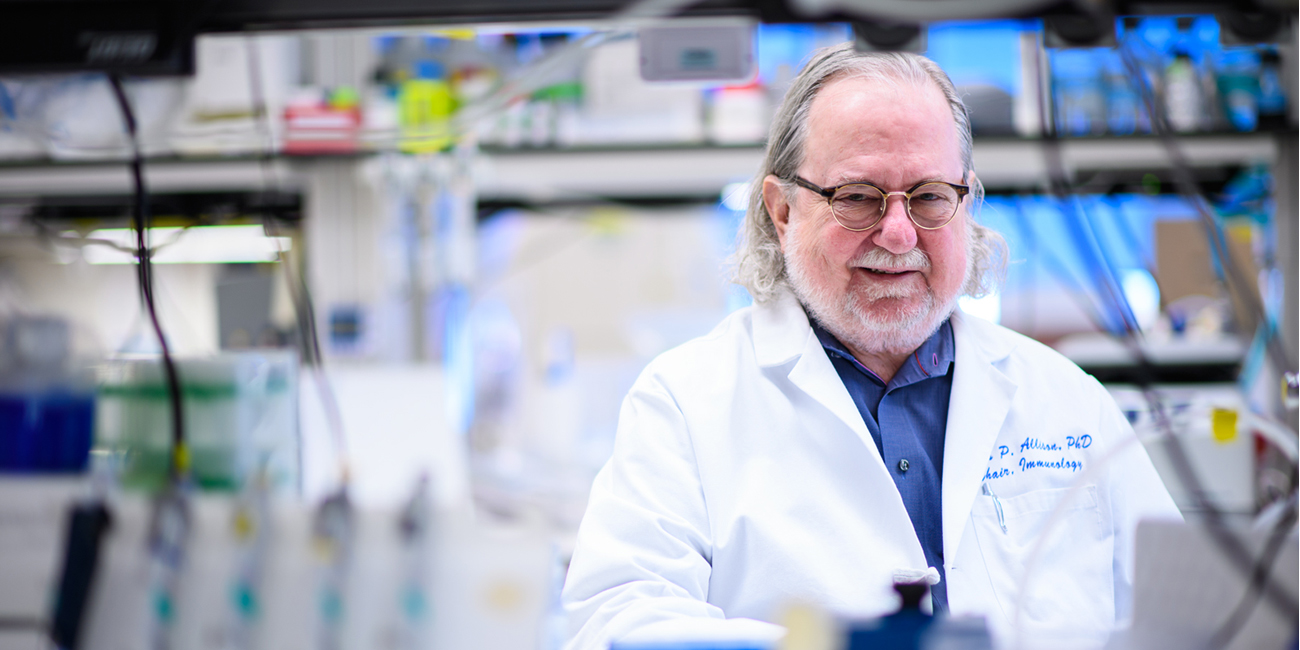
James Allison, Frontiers of Knowledge laureate in 2017, wins the Nobel Prize in Medicine
The American immunologist James Allison, Frontiers of Knowledge laureate in Biomedicine in 2017 (10th edition), has won the 2018 Nobel Prize in Medicine with Japanese scientist Tasuku Honjo. The committee of the Karolinska Institute in Stockholm has decided to award the prize to these two researchers for their pioneering discoveries in the field of immunotherapy treatments against cancer. Allison visited Madrid last June to receive the Frontiers of Knowledge Award, and explained his research at a press conference held at the BBVA Foundation.
1 October, 2018
“Cancer kills millions of people every year and is one of humanity’s greatest health challenges. By stimulating the inherent ability of our immune system to attack tumor cells this year’s Nobel Laureates have established an entirely new principle for cancer therapy”, states the press release for the 2018 Nobel Prize in Medicine.
The Nobel committee explained that James P. Allison studied a known protein that functions as a brake on the immune system: “He realized the potential of releasing the brake and thereby unleashing our immune cells to attack tumors. He then developed this concept into a brand new approach for treating patients.”
“In parallel, Tasuku Honjo discovered a protein on immune cells,” the committee continued, “and, after careful exploration of its function, eventually revealed that it also operates as a brake, but with a different mechanism of action. Therapies based on his discovery proved to be strikingly effective in the fight against cancer.”
“Allison and Honjo showed how different strategies for inhibiting the brakes on the immune system can be used in the treatment of cancer. The seminal discoveries by the two laureates constitute a landmark in our fight against cancer”, the committee concluded.
Pioneer of immunotherapy
In 2011, Allison’s efforts led to the approval by the U.S. medicines agency (the FDA) of the first anti-cancer drug that works by activating the immune system, for the metastatic melanoma indication. The treatment would exceed all expectations, with around 20% of patients still living ten years later. The drug in question – ipilimumab – has produced a “complete paradigm shift” in the way medicine approaches cancer therapy, in the words of Frontiers jury member Lélia Delamarre, Group Leader in the Cancer Immunology Department at biotech company Genentech.
Several drugs based on Allison’s principle have since been approved, seeking to boost the percentage of melanoma patients who can benefit from immunotherapy. Effectiveness has also been found for this line of treatment in lung, kidney, bladder and head and neck cancers.
Immunotherapy works by mobilizing the system’s natural defenses to combat and eliminate specific cancer cells. Over the years, various runs had been made at the strategy, but without success until Allison stepped in. The insight which would transform the therapeutic landscape was his discovery, in the mid-1990s, of a key mechanism in the functioning of the immune system T cells responsible for fighting tumor cells.
Allison, however, is the first to warn that immunotherapy is no one-stop solution: “We’re not going to be able to cure all cancers. But I think that in future immunotherapy will be a part of all cancer treatments, in combination with chemotherapy or radiation. I am optimistic that we will learn the right things to put together to cure a majority of patients, maybe even reaching from 60% to 90% of cases in some kinds of cancers,” he explained after winning the Frontiers of Knowledge Award in Biomedicine.
Biography
James P. Allison (Texas, United States, 1948) earned a BS in Microbiology at the University of Texas, Austin, where he went on to complete a PhD in Biological Science in 1973. He later spent twelve years at the University of California, Berkeley, where he was Professor of Immunology and Director of the Cancer Research Laboratory.
After stints at the Memorial Sloan-Kettering Cancer Center and Cornell University, and as an investigator with the Howard Hughes Medical Institute, in 2012 he joined the team at Texas University’s MD Anderson Cancer Center, where he is currently Chair of the Department of Immunology, Vivian L. Smith Distinguished Chair in Immunology, Executive Director of the Immunotherapy Platform, Deputy Director of the David H. Koch Center for Applied Research of Genitourinary Cancers and Co-Director of the Parker Institute for Cancer Immunotherapy.
He has also kept up a thirty-year association with the National Institutes of Health, where he chaired the Experimental Immunology Study Section and has served on expert panels on gene therapy, as well as organizing a think tank on cancer biology.
He sits on the editorial board of Developmental Immunology and Journal of Clinical Investigation and is a former reviewing editor of Science. The holder of six patents, he is also the co-founder, with his wife and scientific colleague Padmanee Sharma, of clinical stage immunotherapy company Jounce Therapeutics.
The jury of the Frontiers of Knowledge Award in Biomedicine decided to grant him this prize because his research “led to harnessing the immune system to combat cancer in patients and the development of new therapies.” Allison was, according to the jury, the first to demonstrate that immunotherapy can treat cancer effectively, initiating an approach that “has provided clinical benefit to many cancer patients” and “stimulated the development of a new class of drugs employing the immune system to fight cancer.”

